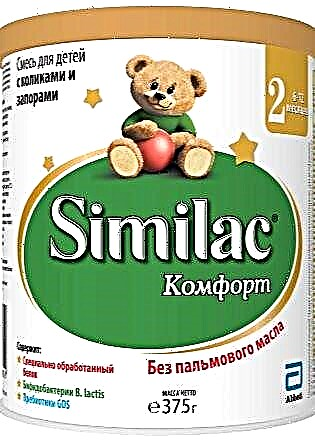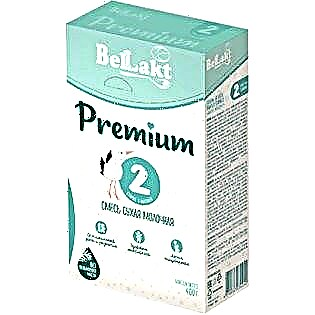
The harm of adding palm oil to food, including those intended for babies, is being actively discussed by both specialists and young parents. Moms are alarmed by the presence of such a herbal ingredient in many infant formula, which even feed newborns. And if they do not want to give this oil to their baby, then the issue of choosing baby food without such a component becomes very relevant.

Why is palm oil in the mixture?
This herbal product is derived from the oil palm and is used in food throughout the world. It is usually included in infant formula as one of the fractions called palm olein. This allows the composition of fats of such nutrition to be closer to that of breast milk, providing the baby with a variety of fatty acids.
The benefits of palm olein include a high content of vitamins A and E, good absorption (95–97%) and the presence of carotenoids. As for harm, from mixtures with the addition of palm oil less calcium absorbed, which can affect bone health, therefore, this mineral is added to the composition of such products in greater quantities. In addition, due to the binding of calcium to fatty acids, soapy substances arise, due to which constipation and colic are possible. This problem is fought by including pre- and probiotic substances in the mixture.
Another disadvantage of oil palm olein is that it is high in saturated fat. which, if consumed in excess, makes such vegetable fat harmful to the cardiovascular system.
However, moderate use (and in infant formula, palm oil is usually only one type of fat) does not harm, so you should not be afraid of baby food with this component.

Thanks to the inclusion of palm olein in powders for adapted infant formulas, such foods are saturated with fats important for the development of the baby. Unlike human milk, which contains palmitic acid, goat or cow milk does not contain this compound. And, since it is precisely such a fatty acid that is present in palm oil in the greatest amount, it is added to the mixture so that these substitutes are as similar as possible to the milk from mother's breast.
However, research and professional assurances about the harmlessness of palm olein to newborns and nursing infants are often inconclusive to young parents. They see palm oil as a cheap substitute for higher quality fats and try to avoid it in their diets. For them, infant formula is produced without this component, and today they are represented by a fairly wide range. The palm fat in these baby food has been replaced by other vegetable fats, such as coconut or rapeseed.
Some manufacturers have found another way out - they began to break down and modify palm olein, adding only its individual fragments to the milk mixture that do not interfere with calcium absorption. An example of such a mixture is "Nutrilon Comfort 1", which contains beta-palmitic acid.


Types of mixtures without palm oil
There are several types of baby food that do not contain palm oil. Such mixtures are divided into the following types.
- Cow's milk products. For newborns, they are made from whey, in which they reduce the amount of protein and calcium, change the composition of fats, and increase the lactose content. Such products for babies 0-6 months are marked with the number 1, for premature and low-birth-weight babies - with the number 0 or the prefix pre. Mixtures with number 2 are used for feeding babies of 6-12 months. They can be not only whey, but also casein. Fermented milk mixtures are distinguished separately, which have the ability to improve digestion by stimulating the development of lactic acid bacteria.
- Goat milk mixtures. Their composition is considered the closest to human milk. Such food is well absorbed, rich in minerals and vitamins, as well as vegetable fats.
- Lactose-free blends or lactose-reduced foods. They are indicated for intestinal infections and non-infectious diarrhea. A lactose-free diet is used for children with milk sugar intolerance.
- Hypoallergenic mixtures... They are given to infants who have developed allergic diseases. If the crumbs have a complete intolerance to cow's milk proteins, a dairy-free soy mixture will be the way out.
- Anti-reflux products. Such mixtures are used in babies with reflux disease. They help to get rid of profuse regurgitation after eating.


Indications
There are situations where avoiding palm fat infant formula is appropriate and important to support the child's health. Formula feeding without palm olein is shown:
- children with cardiovascular pathologies;
- babies with impaired digestion of common mixtures, for example, with constipation, profuse regurgitation, colic, and so on;
- babies who have impaired bone mineralization.
The only contraindication to the use of mixtures that do not contain palm oil is hypersensitivity to any of their components. If allergic symptoms appear, it is recommended to choose another suitable adapted food together with the pediatrician.

Rating of the best mixtures from cow's milk
According to reviews, parents prefer to give babies such adapted formulas that do not contain palm oil.
- Similac. Such baby food is produced by Abbott, offering the Classic, Gold lines and a large selection of special formulas for children with allergies, colic, lactose intolerance, low weight and other problems. The advantages of such products are the absence of maltodextrin, good dissolution, the presence of carotenoids, nucleotides, important fatty acids, pre- and probiotics, and lutein. Such characteristics provide food "Similak" with about 80% of positive reviews.
Among its disadvantages, high cost is often noted. The vegetable fat blend in Similac products includes sunflower, coconut and soybean oils.


- Nestogen. Such adapted food for babies is produced by the well-known company Nestle. The product includes lactobacilli, a balanced vitamin and mineral complex and prebiotics. It does not contain GMOs, flavors, preservatives or other hazardous ingredients. Vegetable fats in Nestogen are represented by low-erucic rapeseed, sunflower and coconut oils. This mixture receives more than 80% of positive reviews, in which it is praised for its high quality, good tolerance, reasonable price, easy dilution without lumps. The disadvantages of "Nestozhen" are a cardboard box and an inconvenient measuring spoon.

- Nan Optipro. This is another product from Nestlé containing an optimized protein complex, nucleotides, bifidobacteria, valuable ARA and DHA fatty acids, l-carnitine, minerals and vitamins important for development. Among the vegetable fats in such a mixture, you can see soybean, coconut and sunflower oil. Approximately 80% of reviews of Nan Optipro infant feeding are positive. In them, the advantages of the product are called availability, pleasant taste, convenient can, quick dissolution.

- Nutrilak premium. Such a product of the Russian company "Infaprim" contains lutein, omega fats, prebiotic components, nucleotides, a complex of vitamins and minerals. From this mixture, the baby will receive natural milk fat, soybean, coconut and sunflower oil, and palm oil, like rapeseed oil, is absent in it. In about 90% of reviews, mothers are satisfied with feeding with such a mixture. They note that the powder is easy to dilute, affordable, and tastes good to most babies. The disadvantages of the mixture include the presence of maltodextrin and inconvenient packaging.

- Bellakt premium... This novelty of a well-known Belarusian manufacturer for babies in the first 6 months of life contains 60% whey proteins, lactose, live bifidobacteria, fish oil, lutein, a vitamin-mineral formula and prebiotics. Vegetable oils in the composition of such a product are represented by soybean, sunflower and coconut.


List of goat milk formulas
If we consider baby food based on goat milk, then palm oil is absent in such products.
- "Nanny". This line of adapted dry foods for children is produced by Bibicall. For the manufacture of these products, natural goat's milk from animals grazing in New Zealand is used. The advantages of these mixtures include the presence of probiotics, omega fats and nucleotides in the composition. The assortment includes the product "Classic" and the line "with prebiotics". Fats in their composition are represented by coconut, sunflower and canola oils.
Nutrition "Nanny" has more than 90% of positive responses from mothers, in which the only drawback is a rather high price. Other disadvantages are the presence of maltodextrin in the formula.

- Cabrita Gold. This baby food is made in Holland from 100% goat milk, so it is suitable for babies who react negatively to cow's milk. The mixture additionally includes bifidobacteria, nucleotides and prebiotics, as well as fish oil, choline and taurine. It contains no sugar and maltodextrin, and more than 80% of the reviews are positive. The fat profile of Cabrita includes rapeseed, sunflower and palm oil, however, the latter is represented by a modified version - beta-palmitate, which does not form calcium soaps.

You will learn more about the opinion of pediatricians on palm oil in infant formula.



